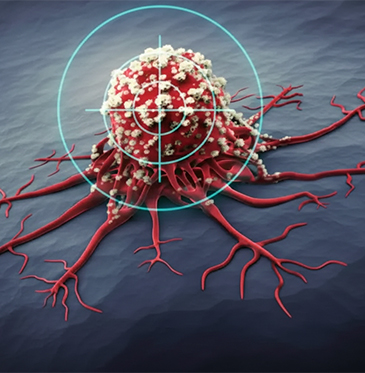
At the Bhagwan Mahaveer Cancer Hospital & Research Centre (BMCHRC), our Neuro Oncology represents the forefront of compassionate cancer care. We understand that a cancer diagnosis can be overwhelming, both physically and emotionally, which is why our dedicated team is committed to providing personalized and comprehensive care to every individual who walks through our doors.
Neuro-Oncology at BMCHRC is dedicated to providing comprehensive care for patients with tumors of the central nervous system. Led by a team of experienced neuro-oncologists, neurosurgeons, radiation oncologists, and other specialists, we offer personalized treatment plans tailored to each patient's specific diagnosis and needs. Our multidisciplinary approach ensures that patients receive the most advanced therapies available, including surgery, radiation therapy, chemotherapy, and targeted therapies. We prioritize compassionate care, focusing not only on treating the tumor but also on addressing the physical, emotional, and cognitive needs of our patients and their families. With a commitment to innovation, collaboration, and excellence, we strive to improve outcomes and enhance the quality of life for individuals affected by neuro-oncological conditions.

At BMCHRC, we offer comprehensive surgical interventions for both benign and malignant tumors affecting the brain, spine, and nerves. Our skilled neurosurgeons utilize advanced techniques and state-of-the-art technology to perform precise tumor resections while preserving neurological function whenever possible. Whether it's a complex brain tumor or a spinal lesion, our team is dedicated to providing safe and effective surgical solutions tailored to each patient's individual needs.

Awake craniotomy is a specialized surgical technique used to remove brain tumors located in crucial or eloquent areas of the brain while preserving neurological function. At BMCHRC, our neurosurgical team is experienced in performing awake craniotomies, allowing patients to remain awake and responsive during surgery to help map and protect vital brain functions. This advanced approach enables us to achieve maximal tumor removal while minimizing the risk of neurological deficits.

Endoscopic Surgery is a Minimally Invasive approach that utilizes small incisions and specialized instruments to access and treat lesions within the brain and skull base. At BMCHRC, our neurosurgeons are skilled in performing endoscopic procedures for conditions such as Pituitary Tumors, Hydrocephalus, and Intraventricular lesions. With this advanced technique, we aim to achieve optimal outcomes while reducing surgical trauma and recovery time for our patients.

Our pediatric neurosurgery team specializes in providing surgical care for children with neurological conditions, including brain tumors, spinal disorders, and congenital anomalies. With expertise in pediatric neurosurgical techniques and a compassionate approach to care, we strive to optimize outcomes and improve the quality of life for our young patients and their families.

BMCHRC offers specialized surgical interventions for challenging skull-base tumors and vascular lesions. Our neurosurgeons are trained in advanced techniques for accessing and removing tumors located in complex anatomical regions while minimizing the risk of damage to surrounding structures. Through meticulous preoperative planning and intraoperative navigation, we aim to achieve complete tumor resection and preserve neurological function.

Our neurosurgical team is experienced in performing a wide range of spine surgeries to treat conditions such as herniated discs, spinal tumors, degenerative spine disease, and spinal deformities. Using advanced surgical techniques and state-of-the-art spinal instrumentation, we aim to alleviate pain, restore spinal stability, and improve overall function for patients with spinal disorders. Whether it's a minimally invasive procedure or complex spinal reconstruction, we are committed to providing personalized and effective care for each patient.
Meet our esteemed team of medical professionals, each equipped with years of specialized expertise and unwavering dedication to patient care.
Our Neuro Oncology Department offers a range of advanced treatment modalities tailored to each patient's specific diagnosis and treatment goals:
Neuro Oncology is a specialized Field Of Medicine focused on The Diagnosis and treatment of Tumors affecting the Brain, Spinal Cord, and Peripheral Nerves. It encompasses a wide range of conditions, including Primary Brain Tumors, Metastatic Brain Tumors, Spinal Cord Tumors, and Peripheral Nerve Tumors.
Common symptoms of Neurologic Cancers may include Headaches, Seizures, Cognitive Changes, Motor or Sensory Deficits, Balance and Coordination Problems, Visual Disturbances, and changes in Personality Or Behavior. Symptoms can vary depending on the location, Size, And Type Of Tumor.
Neurologic Cancers are Diagnosed through a combination of Imaging Tests such as MRI, CT Scans, and PET Scans, Along with Neurological Examinations, Biopsy Procedures, and Molecular Testing. These Diagnostic tools help determine the Location, Size, and Characteristics of the Tumor.
Risk Factors for Neurologic Cancers may include Genetic Predisposition, Exposure To Ionizing Radiation, Certain Hereditary Syndromes, Immune System Disorders, Environmental Toxins, and Previous History Of Cancer Treatment.
Treatment Options for Neurologic Cancers may include Surgery, Radiation Therapy, Chemotherapy, Targeted Therapy, Immunotherapy, and Supportive Care Interventions. The choice of treatment Depends On Factors such as Tumor Type, Location, Size, and Individual Patient Factors.
Prognosis for Neurologic Cancers varies depending on factors such as Tumor Type, Stage, Grade, Location, and Treatment Response. Some Tumors may have a more Favorable Prognosis with Early Detection and Aggressive Treatment, while others may be more challenging to Treat and have a Poorer Prognosis.
While the exact causes of neurologic cancers are not always known, adopting a healthy lifestyle, avoiding exposure to environmental toxins, practicing sun safety, and participating in regular physical activity may help reduce the risk of certain types of Neurologic Cancers.
Supportive Care Services for patients with Neurologic Cancers may include Pain Management, Symptom Management, Psychological Support, Nutritional Counseling, Rehabilitation Services, Palliative Care, and Access to Support Groups or Community Resources.
Some Neurologic Cancers, such as certain types of Brain Tumors associated with Hereditary Syndromes like Neurofibromatosis or Li-Fraumeni syndrome, may have a Genetic Component. Genetic Counseling and Testing may be recommended for individuals with a family history of Neurologic Cancers.
Yes, Clinical Trials are available for Patients with Neurologic Cancers to evaluate new Treatment Approaches, Investigational Drugs, and Emerging Technologies. Participation in Clinical Trials may offer Access to Cutting-Edge Therapies and contribute to Advancements in the Field of Neuro Oncology.
Coping with the Emotional and Psychological challenges of Neurologic Cancer Diagnosis and Treatment may involve seeking support from Mental Health Professionals, Joining Support Groups, Maintaining open communication with Healthcare Providers, Practicing Relaxation Techniques, and Engaging In Activities that promote Well-Being.
During the treatment process for Neurologic Cancers, patients can expect to undergo a series of Diagnostic Tests, consultations with specialists, treatment planning sessions, and follow-up appointments to monitor treatment response and manage side effects. Open communication with healthcare providers and adherence to treatment recommendations are essential.
Yes, Neurologic Cancers can recur after treatment, especially if not all Cancer Cells are eliminated during initial Therapy. Regular follow-up appointments, Imaging Scans, and surveillance tests are important for monitoring for signs of recurrence and adjusting treatment as needed.
Patients can advocate for themselves in the management of Neurologic Cancers by educating themselves about their diagnosis, treatment options, and available support services; asking questions and seeking clarification from healthcare providers; seeking second opinions if necessary; and actively participating in shared decision-making about their care.
Resources available for Patients and families affected by Neurologic Cancers may include Patient Education Materials, Online Support Communities, Advocacy Organizations, Financial Assistance Programs, Caregiver Support Services, and Integrative Medicine Programs. Healthcare Providers and Social Workers can help connect Patients and Families with these resources.
Request a callback from our healthcare specialist

